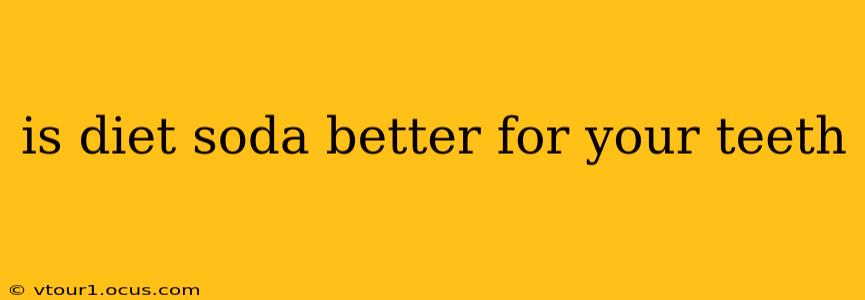Is Diet Soda Better for Your Teeth Than Regular Soda? The Surprising Truth
The age-old question: is diet soda a healthier alternative to regular soda, especially for your teeth? While it might seem like swapping sugar for artificial sweeteners is a win-win, the reality is far more nuanced. The simple answer is no, diet soda isn't definitively "better" for your teeth than regular soda, though it does present a different set of challenges.
Both regular and diet sodas share a common enemy of dental health: acidity. The high acidity levels in both types of soda erode tooth enamel, increasing your risk of cavities and sensitivity. This erosion occurs regardless of the presence of sugar.
What Makes Soda Acidic and How Does it Harm Teeth?
The acidity in soda comes from phosphoric acid and citric acid, common ingredients that contribute to its tart taste. These acids lower the pH in your mouth, making it more acidic and weakening the protective enamel layer. When enamel weakens, it becomes more susceptible to damage from bacteria and other harmful substances. Regular exposure to acidic drinks like soda creates a cycle of acid attacks, leaving your teeth vulnerable.
Does Diet Soda Cause Cavities?
While diet soda doesn't contain sugar, which feeds bacteria and contributes directly to cavity formation, its high acidity still poses a significant threat. The acid attacks the enamel, creating microscopic imperfections where bacteria can easily colonize and potentially lead to cavities.
Is Diet Soda Better for Your Teeth Than Regular Soda? A Comparative Analysis
While both are detrimental, regular soda adds insult to injury by providing fuel for bacteria. The sugar in regular soda is metabolized by bacteria, producing acids that further erode enamel. Therefore, while diet soda might seem like the “lesser of two evils,” it's still harmful to dental health.
What About Artificial Sweeteners? Are They Harmful to Teeth?
Artificial sweeteners themselves don't directly contribute to cavities in the same way sugar does. However, some studies suggest that certain artificial sweeteners may impact the oral microbiome, potentially affecting overall oral health in indirect ways. Further research is still needed to fully understand the long-term effects.
How Can I Protect My Teeth from Soda?
The best approach is to significantly limit or eliminate your soda consumption, whether regular or diet. If you do consume soda, consider these strategies:
- Drink soda in moderation: Limit your intake to occasional treats rather than daily consumption.
- Use a straw: This helps minimize contact between the soda and your teeth.
- Rinse your mouth with water: After consuming soda, rinse your mouth thoroughly with water to help neutralize the acid.
- Maintain good oral hygiene: Brush and floss regularly to remove food particles and plaque, and see your dentist regularly for check-ups and cleanings.
In conclusion, neither regular nor diet soda is beneficial for your teeth. While diet soda lacks the sugar that fuels cavity-causing bacteria, its high acidity still poses a significant risk to tooth enamel. The healthiest option is to minimize or eliminate soda consumption altogether and adopt a comprehensive oral hygiene routine.
